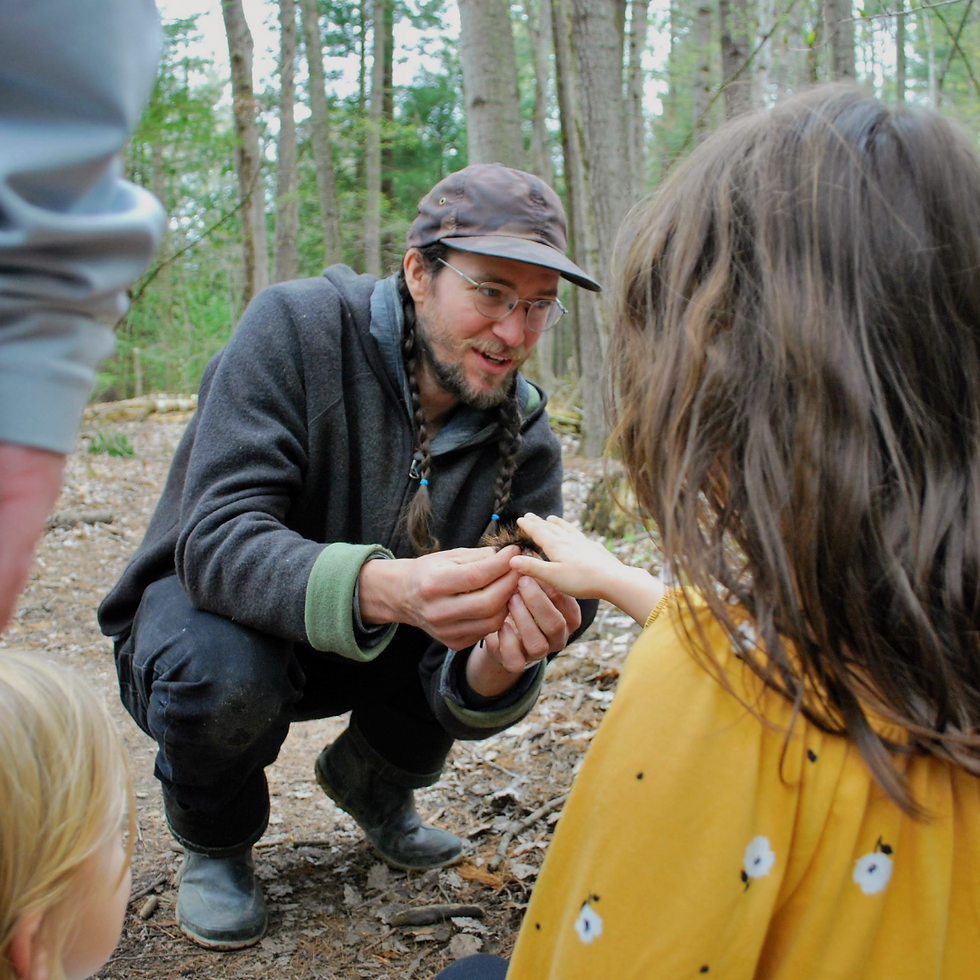Celebrating Spring and Conservation: 2023 Rock Point Nature Celebration
- Rock Point Communications
- May 8, 2023
- 6 min read
The wonders of early spring were on full display for our first annual Rock Point Nature Celebration on Saturday, April 29, wowing a crowd of about 100 folks of all ages, from preschoolers to seniors.

Rock Point Commons hosted the event as part of the Greater Burlington Nature Celebration, a collaboration of community partners to celebrate the arrival of spring and to foster deeper connections with the natural world. “We are always looking for ways to engage our community in our conservation work here at Rock Point,” noted Rock Point Commons Executive Director Kelly Kimball. “The City Nature Celebration was an opportunity to showcase the wonders of Rock Point while inviting our friends and neighbors to connect with the rare and fragile natural communities that call this place home.”
Rock Point’s partners make this wilderness sanctuary a thriving hub for place-based education, spirituality, and environmental stewardship. At the celebration, our partners, including Crow’s Path, Lake Champlain Land Trust, Spoonful Herbals, and CRAG-VT, offered free workshops and opportunities to learn more about their programs.
Attendees braved overcast skies and even some light rain to join experts identifying early spring wildflowers, to learn about abundant medicinal plants many of us overlook as pesky weeds, and to explore the patterns and rhythms of early spring in Rock Point’s wilderness.

Lake Champlain Land Trust
The wildflower walk with Chris Boget, Executive Director of the Lake Champlain Land Trust, drew more than 30 people eager to see spring ephemerals that thrive on the floor of the rich, undisturbed woodlands at Rock Point. (The Lake Champlain Land Trust holds a conservation easement on the Rock Point Peninsula and helps steward the land and trails.)
Nature did not disappoint. On display were Yellow Trout Lily, whose leaves mottled with brown or gray are said to resemble the coloring of a brook trout; Red Trillium, also known as Wake Robin (after a robin’s red breast) and Stinking Benjamin; Blue Cohosh; Bloodroot, (named for the reddish liquid alkaloid in its rhizomes), White Trillium, and Hepatica.
Boget rates Rock Point a “spectacular” place to view spring wildflowers, and he said May 1 generally is prime time for viewing. Don’t wait too long. These spring “ephemerals” are just that, disappearing when the tree canopies fill out.

Crow's Path
Crow’s Path field naturalists Teage O’Connor and Ross Doree introduced groups of kids and adults to phenology, the study of the seasonal rhythms, cycles, and patterns of nature. The kids went off into the woods to taste the spring leaves of Trout Lily and American Beech. They were drawn into the ravine by the skunk cabbage and the trickling creek before discovering a mysterious tuft of animal fur, old scat, and a chewed-up bone. Then, of course, they ran and hid and sneaked and played. Meanwhile, the adults explored photosynthetic bark in quaking aspens, wagged pollen free from hophornbeam flowers, listened to the sweet trill of chipping sparrows, and admired the red sunscreen pigments of young sugar maple leaves and sun-exposed raspberry shoots.
Kids and grownups who would like to learn more about phenology and other ways to connect to the nonhuman world can find more learning opportunities with Crow’s Path. As part of Crow’s Path’s mission to use a relationship-centered approach to promote, foster, create and support direct, hands-on opportunities for people of all ages to reconnect to the natural world, Crow’s Path runs a Field School and youth camps where kids can immerse themselves in the creative expanse of the wild world here at Rock Point, and offers natural history courses, internships, and volunteer opportunities for adults.

Spoonful Herbals
Another popular event was Spoonful Herbals Co-Director Kara Buchanan’s identification of medicinal plants that grow abundantly in our midst and often don’t get the respect they deserve. “If you can’t beat ‘em, eat ‘em,” she quipped about medicinal weeds. To help newbies get started, she provided recipe cards for creating a delicious pesto from wild weeds, and a freshly made batch of Spoonful’s Wild Weeds Pesto was served atop pizza still hot from being wood fired on site.
The much-maligned dandelion, for instance, is chock full of vitamins A, B, C, and D, as well as minerals, such as iron, potassium, and zinc. And dandelions, which can be used to make tea, are a natural diuretic to help the body get rid of too much fluid. The leaves can be eaten alone, and Buchanan recommends cooking them in butter or bacon grease to tame the bitterness.
Garlic Mustard, a non-native invasive, is rich in vitamins A, C, and K. Now is a good time to eat it, she said, before it gets too bitter. (Older plants need to be cooked thoroughly as they contain cyanide.) Beautiful violets, which can be found in most of our lawns, also are healthy to eat, but only the flower and leaves – not root – should be eaten. They add a surprising spark of color to salads and the leaves can be used to thicken soup. They also look pretty as a garnish; candied and used to decorate cakes or cupcakes; frozen in ice cubes; or made into a syrup.
Buchanan said one of the most beneficial plants to forage is Stinging Nettle. It is so packed with nutrition that herbalists often say, “When in doubt, use nettles,” Buchanan said. It grows rapidly and can be cut back five times a season and shouldn’t be allowed to grow over 18-24 inches tall, she said. Just pick the top 6-8 inches or so, before it flowers. It also makes good plant food for other plants. Nettles like fertile soil, so Buchanan suggests growing it near your compost. Nettles do sting, so use gloves and shears.
Attendees also learned how to make a spit poultice using plantain to treat stings and bites. The leaf can be chewed up and placed on irritated skin and held in place with a bandage.
It’s important to follow one simple rule when you forage for wild plants: be 100% sure of your identification before eating anything. Buchanan recommends an app called Seek by iNaturalist. It will help you identify what you’re looking at, and if you really get into it, you can earn badges for seeing different types of birds, amphibians, plants, and fungi and participate in monthly observation challenges.
If your interest in medicinal plants has been piqued, you might want to check out Spoonful Herbals Apprenticeship program, anchored at the Rooted Heart Rising garden at Rock Point. Attendees learn how to identify, cultivate, and create food and medicine with native and cultivated herbs in locations around the greater Burlington area.

The Rock Point Nature Celebration was truly a feast for all senses – especially taste. In addition to nibbling on violet leaves and Garlic Mustard, attendees were treated to delicious tomato-based wood-fired pizzas and high-end s’mores featuring a variety of chocolate courtesy of Lake Champlain Chocolates. An added bonus was fresh honey, still in the comb. Resident beekeeper, Gus Buchanan, was there cleaning out his hives and breaking apart honeycomb for the lucky takers standing nearby.
“This is such a beautiful space and such a generous event,” said Dolan of Richmond. “Free pizza. Free s’mores. And free honey!” Philip England of Burlington agreed. He said he was particularly thankful for Rock Point during COVID. “It was such a nice respite from being inside,” he said. England is treasurer of CRAG-VT, which works to protect, steward, and conserve access to Vermont rock and ice climbing. In 2017 it partnered with the Episcopal Diocese of Vermont, which owns Rock Point, to open Lone Rock Point to climbing. “We are super grateful to have this relationship,” he said.
It's safe to say that attendees left Rock Point with a renewed wonder at all the marvels nature – and these amazing 130 acres – provide for those who take time to stop and look.
We are so grateful to all of our partners who donated their time and generously shared their expertise and passion with our guests, including Crow’s Path, Spoonful Herbals, Lake Champlain Land Trust, and CRAG-VT. We are also thankful to Vermont Tent Company for providing shelter from the spring rain, and to Lake Champlain Chocolate for providing chocolate bars for our s’mores.
Be sure to follow Rock Point Commons on Facebook and Instagram, as well as our website, to learn about upcoming events.
Please remember that Rock Point Common’s conservation work and mission depend on the generosity of people who love and value this sanctuary in Vermont’s largest city. A gift is welcome anytime here.
.png)




Comments